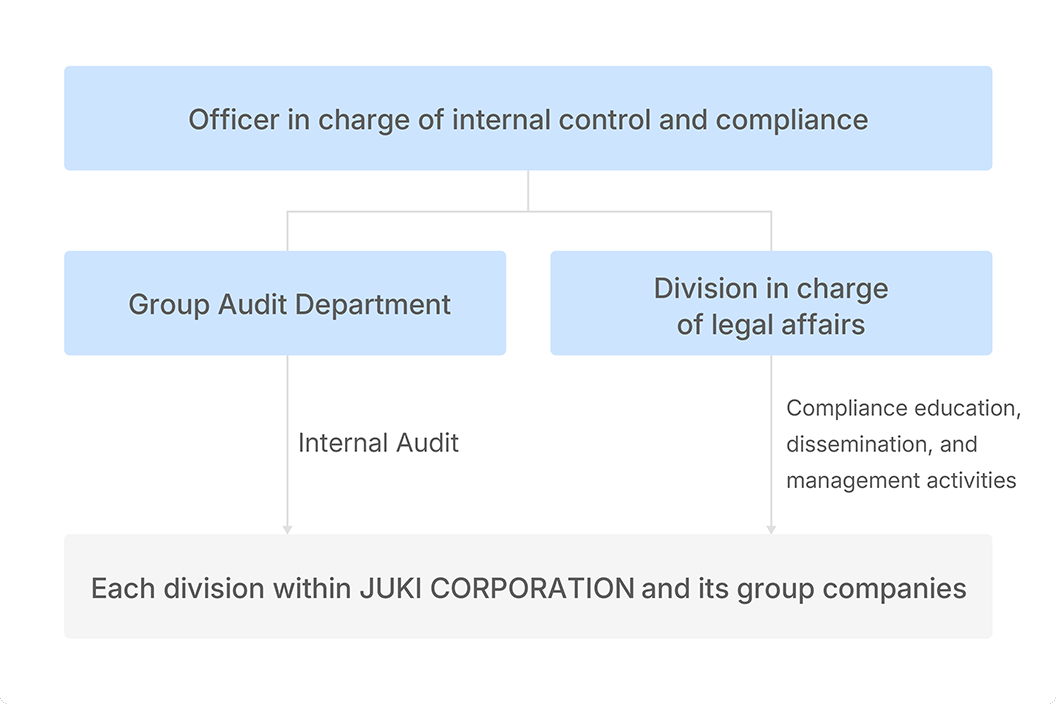Compliance
Basic Approach
JUKI strives to efficiently ensure compliance not only with laws within the JUKI Group but also with ethical standards and soft laws. This commitment enables JUKI maintain and enhance its corporate value by fulfilling accountability as a company and by securing stakeholder trust.
JUKI has established the “JUKI Corporate Code of Conduct,” the “JUKI Group Employee’s Code of Conduct,” and other compliance-related rules and regulations to serve as standards and rules of conduct that empower the JUKI Group and its officers and employees to choose appropriate actions. Based on these rules and regulations. JUKI maintains a compliance system and conducts educational activities for the officers and employees of the JUKI Group.
JUKI also positions and operates compliance as one of the most important management issues to be promoted and addressed by the entire JUKI Group as part of the internal control system.
Compliance Promotion Structure
The Board of Directors of JUKI makes decisions on the maintenance and improvement of the compliance system and important compliance-related matters.
As the person with ultimate responsibility under this structure, the officer in charge of “Internal Control and Compliance” supervises the Group Audit Department and the division in charge of legal affairs.
In addition to ensuring that the compliance system established by the JUKI Group is properly maintained, the Risk Management Conference operated by the division in charge of legal affairs as the secretariat oversees, manages, and provides guidance on new compliance risks that arise in association with changes in the environment and strengthens the management of the entire Group.
Compliance Promotion Structure Chart

Whistle-blowing System
The JUKI Group has established an “Employee Consultation Desk” that allows anonymous reporting as a whistle-blowing system. The operational status of the Employee Consultation Desk is reported at the Risk Management Conference and the Audit & Supervisory Board.
The fact that whistle-blowers are not subjected to any disadvantage is clearly stated in both the company rules and the company’s basic policy on the internal control system.
In order to maintain a properly functioning whistle-blowing system, JUKI has designed a whistle-blowing system based on the “Whistle-blowing Regulations” for all of the JUKI group companies in Japan, in addition to the conventional “Employee Consultation Desk.”
To facilitate whistle-blowing, whistle-blowers can report anonymously to the whistle-blowing desk. The desk, moreover, can be accessed from not only inside of the company (the division in charge of legal affairs or compliance, full-time Audit & Supervisory Board Member), but also from outside of the company (outside lawyers).
The operational status of the desk is regularly reported at a Risk Management Conference and the Board of Directors.
In addition, the “Whistle-blowing Regulations” protect whistle-blowers and fact-finding collaborators by clearly stipulating that their identities are to remain confidential and prohibiting disadvantageous treatment or claims for damages, etc. against them.
Main Initiatives
JUKI has assigned roles and responsibilities as the implementers of compliance activities to each of its division in charge of legal affairs, group companies, and overseas controlling companies to ensure compliance.
The division in charge of legal affairs is responsible for compliance activities as the group’s cross-functional compliance controller.
The Risk Management Conference manages compliance risks of the entire JUKI Group that may have a significant impact on management and business through the JUKI Group’s supply chain.
Specifically, the Risk Management Conference discusses and evaluates compliance risk trends, the implementation and monitoring of improvement measures, the determination of additional measures, and the appropriateness of implemented measures.
In addition, the division in charge of compliance provides training to officers and employees who are seconded to the JUKI group companies as presidents or other officers on the following: the “JUKI Group Employee’s Code of Conduct,” compliance risks that may arise in corporate management, risk management, and compliance with other regulations and laws in other countries.
JUKI also works with each of its group company to gather information on the enactment and revision of domestic and foreign laws and regulations in relation to its business activities, and take necessary measures by examining the impacts of the same on its business activities sequentially.